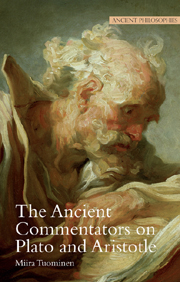4 - Physics
Summary
After our longish journey through the commentators' views concerning the structure and acquisition of knowledge, we can now turn to discuss their more specific views concerning the world around us. We shall begin with physics. By the time of the commentators, physics was understood as a systematic study of natural things, as the name also indicates (phusikē; Greek phusis means “nature”). However, to say that the topic of the present chapter is physics as a study of natural things raises a more important question: how was nature understood? This is a question to which the commentators gave different answers, and we shall address those answers in § “Definitions of nature and natural things”, below. In addition to natural things, the physics of the commentators extends to notions that we would tend to categorize into metaphysics: place and time, structure of matter, possibility of change. These notions are not natural things, but they provide the abstract preconditions or tools for analysing and explaining change in natural things. The overall outlook of Aristotelian physics that also applies to the physics of the commentators is one of a philosophical analysis of change or natural philosophy rather than that of an experimental natural science.
One crucial feature of physical things in the commentators' analysis is that they change. Based on Aristotle's distinctions, change (kinēsis) was understood as a general category that comprises four subtypes:
change of substance (transformations; in particular of the elements earth, water, air and fire into each other);
change of quantity (growth and shrinkage);
change of quality or alteration; and
change of place (locomotion).
- Type
- Chapter
- Information
- The Ancient Commentators of Plato and Aristotle , pp. 118 - 157Publisher: Acumen PublishingPrint publication year: 2009

